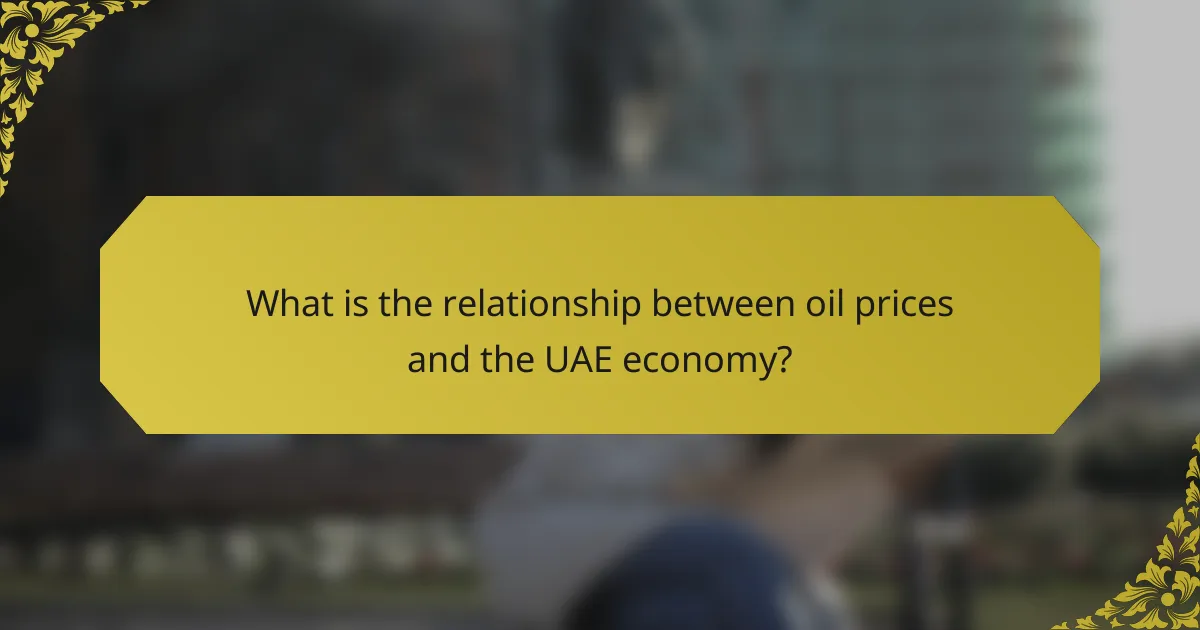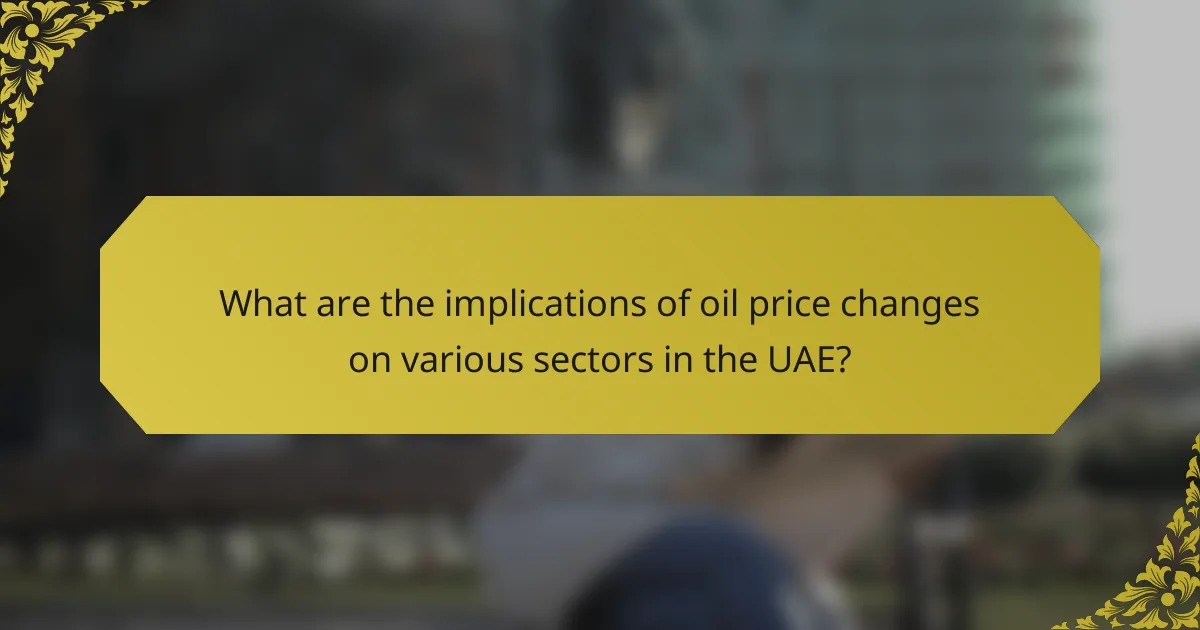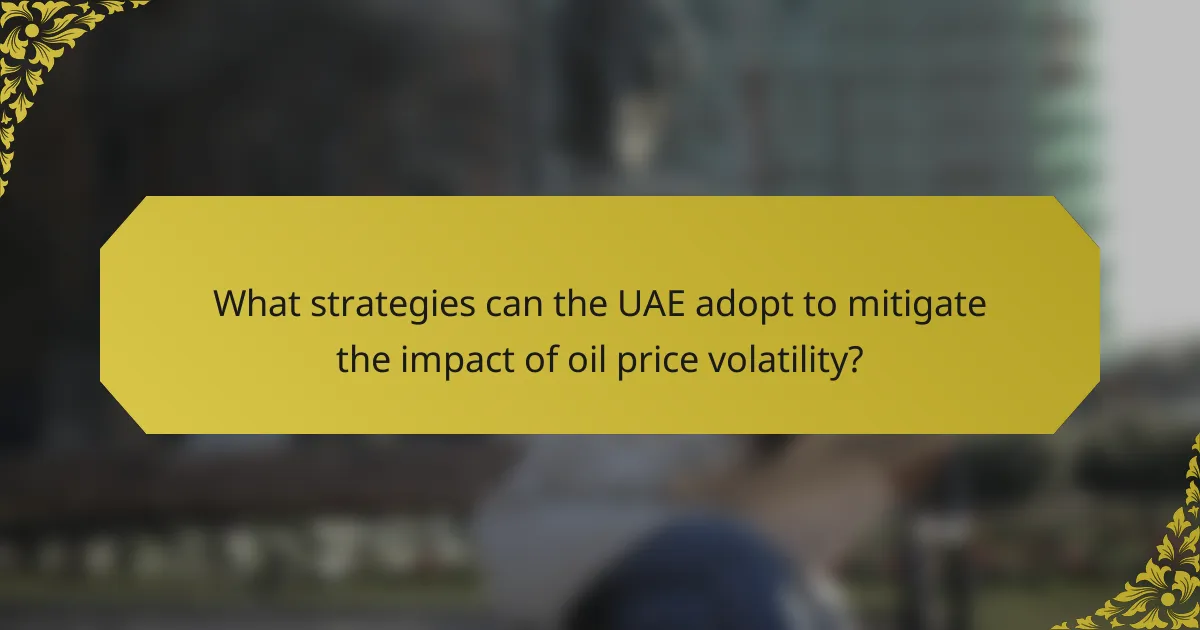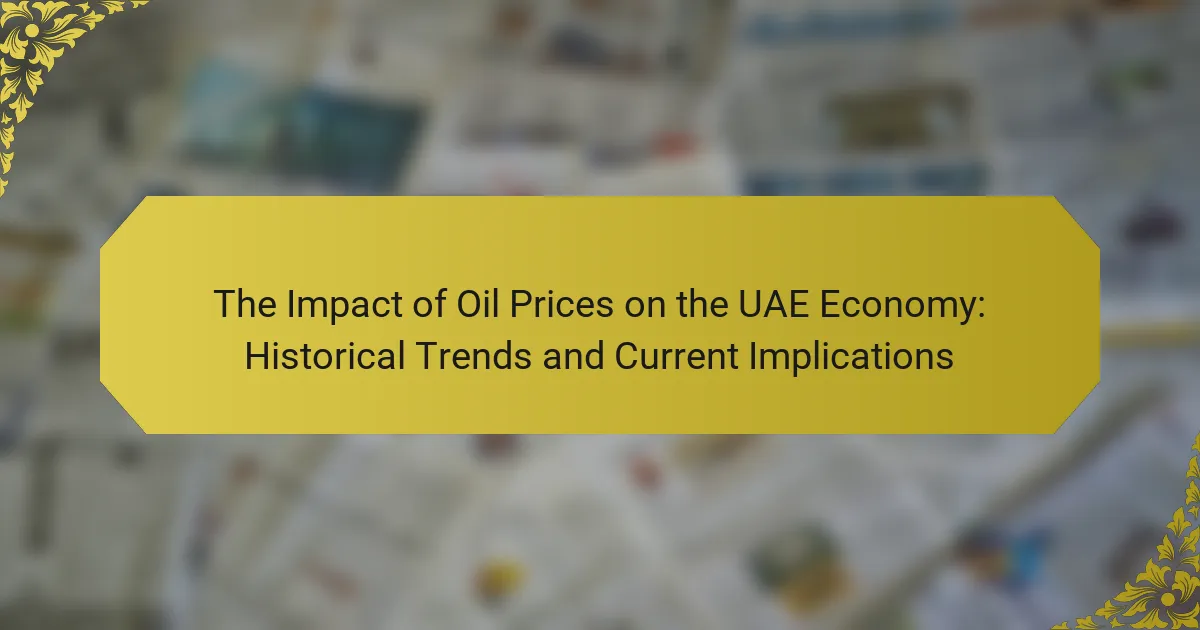
What is the relationship between oil prices and the UAE economy?
Oil prices significantly influence the UAE economy. The UAE is one of the world’s largest oil exporters. Fluctuations in oil prices directly affect government revenues. Higher oil prices lead to increased national income. This income supports public spending and infrastructure projects. Conversely, lower oil prices can result in budget deficits. The UAE has made efforts to diversify its economy. However, oil remains a crucial economic driver. In 2021, oil accounted for approximately 30% of the UAE’s GDP. Thus, the relationship between oil prices and the UAE economy is both direct and impactful.
How have historical oil prices influenced the UAE’s economic growth?
Historical oil prices have significantly influenced the UAE’s economic growth. Fluctuations in oil prices directly impact the country’s GDP. For instance, during the oil boom of the 1970s, the UAE experienced rapid economic expansion. Oil revenue funded infrastructure projects and diversified the economy. Conversely, during price declines, such as in the late 1980s, economic growth slowed. The 2008 financial crisis also saw oil prices drop, affecting government budgets. Recent high oil prices have spurred investment in renewable energy and tourism. Overall, oil price trends have shaped the UAE’s economic landscape and future planning.
What key historical events have shaped oil prices in the UAE?
The key historical events that have shaped oil prices in the UAE include the discovery of oil in 1958, the formation of OPEC in 1960, and the Gulf War in 1990-1991. The discovery of oil led to rapid economic development and increased global interest in UAE oil. OPEC’s establishment allowed member countries to coordinate production and influence global oil prices. The Gulf War caused significant disruptions in oil supply, leading to price volatility. Additionally, the financial crisis of 2008 resulted in a sharp decline in oil prices, impacting the UAE’s economy. Each of these events has played a crucial role in determining the trajectory of oil prices in the UAE.
How did fluctuations in oil prices affect GDP in the UAE?
Fluctuations in oil prices significantly impacted GDP in the UAE. When oil prices rise, the UAE experiences increased revenue from oil exports. This boost in revenue often leads to higher government spending and investment in infrastructure. Consequently, GDP growth accelerates during periods of high oil prices. Conversely, when oil prices decline, the UAE faces reduced export revenues. This decline can lead to budget deficits and decreased public spending. As a result, GDP growth may slow or even contract during periods of low oil prices. Historical data shows that oil price fluctuations directly correlate with GDP growth rates in the UAE. For instance, during the oil price crash in 2014-2016, GDP growth fell to 1.7% in 2016, down from 4.2% in 2014.
What are the current trends in oil prices affecting the UAE?
Current trends in oil prices are showing a significant increase, positively impacting the UAE economy. As of October 2023, Brent crude oil prices have risen to approximately $90 per barrel. This rise is attributed to increased global demand and supply constraints. The UAE, being a major oil producer, benefits from higher revenues as prices climb. In the first half of 2023, the UAE reported a 30% increase in oil export revenues compared to the previous year. Additionally, the government’s budget surplus has improved due to these elevated oil prices. This trend supports infrastructure investments and economic diversification efforts in the UAE.
How do current global oil price trends impact the UAE’s economic policies?
Current global oil price trends significantly influence the UAE’s economic policies. Fluctuating oil prices directly affect government revenue, as oil exports constitute a major portion of the UAE’s income. When prices are high, the UAE can increase public spending and invest in infrastructure projects. Conversely, low oil prices prompt the government to implement austerity measures and diversify its economy.
In 2020, for example, the COVID-19 pandemic caused a sharp decline in oil prices, leading the UAE to accelerate its economic diversification initiatives. The UAE Vision 2021 aims to reduce reliance on oil by investing in sectors like tourism and renewable energy. Therefore, current oil price trends shape strategic planning and fiscal policies in the UAE.
What role does OPEC play in regulating oil prices for the UAE?
OPEC plays a crucial role in regulating oil prices for the UAE. As a member of OPEC, the UAE participates in collective decisions regarding oil production levels. These decisions directly influence global oil supply and, consequently, oil prices. OPEC aims to stabilize oil markets and secure a steady income for its member countries. The organization adjusts production quotas based on market conditions and demand forecasts. For instance, in response to price drops, OPEC may cut production to support higher prices. This coordinated approach helps mitigate price volatility. Historical data shows that OPEC’s actions have significantly impacted oil prices over the years. The UAE benefits from OPEC’s strategies, which help maintain its economy’s stability.

What are the implications of oil price changes on various sectors in the UAE?
Oil price changes significantly impact various sectors in the UAE. The oil and gas sector directly experiences revenue fluctuations based on price changes. Higher oil prices typically lead to increased government revenues, which can boost public spending. This, in turn, positively affects the construction and infrastructure sectors, as more projects may be funded. Conversely, lower oil prices can lead to budget cuts, negatively impacting these sectors.
The tourism sector also feels the effects of oil prices. High oil prices can increase travel costs, potentially reducing tourist numbers. In contrast, lower prices may encourage more travel and tourism spending. The retail sector is similarly affected; consumer spending can decline during periods of low oil prices due to reduced disposable income.
The financial sector in the UAE is influenced by oil price changes as well. Banks may face higher risks with lower oil prices, leading to tighter lending conditions. Overall, the implications of oil price changes ripple across various sectors, influencing economic stability and growth in the UAE.
How do oil price fluctuations affect the UAE’s government revenue?
Oil price fluctuations significantly impact the UAE’s government revenue. The UAE relies heavily on oil exports for its fiscal income. When oil prices rise, government revenue increases, leading to higher public spending. Conversely, falling oil prices reduce revenue, prompting budget cuts. In 2020, for instance, oil prices dropped sharply due to the pandemic, resulting in a revenue decline of nearly 30%. This dependency means that sustained low prices can lead to economic challenges for the UAE. The government has implemented diversification strategies to mitigate these effects, but oil revenue remains a critical component of its budget.
What percentage of the UAE’s budget relies on oil revenue?
About 30% of the UAE’s budget relies on oil revenue. This percentage indicates the significant role oil plays in the nation’s economy. The UAE has diversified its economy in recent years. However, oil revenue remains a crucial funding source. The dependency on oil revenue can fluctuate with global oil prices. Historical data shows that this percentage has varied over time. Economic diversification efforts aim to reduce this reliance. Nevertheless, oil revenue continues to influence budget planning and economic stability.
How do changes in oil prices impact public spending in the UAE?
Changes in oil prices significantly impact public spending in the UAE. The UAE economy is heavily reliant on oil revenues. When oil prices rise, the government typically experiences increased revenue. This leads to higher public spending on infrastructure, healthcare, and education. Conversely, when oil prices fall, revenue declines. This can result in budget cuts and reduced public spending. For example, in 2015, a decline in oil prices led to a reduction in government spending growth. The UAE government responded by implementing fiscal reforms to manage the budget. These trends highlight the direct correlation between oil prices and public expenditure in the UAE.
What effects do oil prices have on the UAE’s job market?
Oil prices significantly impact the UAE’s job market. When oil prices rise, the UAE experiences economic growth. This growth leads to increased investment in various sectors. Consequently, job creation occurs, particularly in construction and services. Conversely, when oil prices fall, the economy contracts. This contraction results in job losses and reduced hiring. Historical data shows that during the 2014 oil price decline, the UAE faced increased unemployment rates. The correlation between oil prices and job availability is well-documented in economic studies. Thus, fluctuations in oil prices directly influence employment levels in the UAE.
How do fluctuations in oil prices influence employment rates in the UAE?
Fluctuations in oil prices significantly influence employment rates in the UAE. When oil prices rise, the UAE experiences increased government revenues. This leads to higher public spending and investment in infrastructure projects. Consequently, job creation occurs in various sectors, including construction and services. Conversely, when oil prices decline, government revenues decrease. This often results in budget cuts and reduced spending. As a result, employment rates may decline, particularly in oil-dependent sectors. Historical data shows that during periods of low oil prices, unemployment rates in the UAE have risen. For instance, the 2014 oil price drop led to layoffs in the oil and gas sector. Hence, the correlation between oil prices and employment rates in the UAE is evident.
Which sectors are most affected by changes in oil prices regarding employment?
The sectors most affected by changes in oil prices regarding employment are the oil and gas sector, transportation, and manufacturing. The oil and gas sector directly experiences job fluctuations due to price volatility. Employment levels in this sector can significantly decline when oil prices drop. Transportation, including logistics and shipping, also suffers as fuel costs rise or fall. Manufacturing industries that rely on oil as a raw material or energy source are similarly impacted. Historical data shows that in the UAE, a 30% decline in oil prices can lead to a 10% decrease in employment in these sectors.

What strategies can the UAE adopt to mitigate the impact of oil price volatility?
The UAE can adopt several strategies to mitigate the impact of oil price volatility. Diversifying its economy is crucial. This involves investing in sectors such as tourism, renewable energy, and technology. For instance, the UAE aims to generate 50% of its energy from clean sources by 2050. Establishing a sovereign wealth fund can help stabilize the economy during downturns. This fund can invest in global assets, providing a buffer against oil revenue fluctuations. Implementing fiscal policies that reduce dependency on oil revenues is also essential. The UAE has already introduced taxes and fees to diversify its income sources. Strengthening trade relations with other countries can enhance economic resilience. The UAE has signed numerous trade agreements to facilitate this. Investing in infrastructure can create jobs and stimulate economic growth. The UAE has committed to major infrastructure projects to support this strategy. Finally, improving financial regulations can enhance market stability. The UAE has made strides in regulatory reforms to attract foreign investment.
How can diversification of the economy help the UAE?
Diversification of the economy can help the UAE by reducing its dependence on oil revenues. This shift can lead to increased economic stability. A diversified economy can create new job opportunities in various sectors. It can also attract foreign investment, enhancing overall economic growth. The UAE’s non-oil sector has already shown significant growth, contributing 70% to the GDP in recent years. This transition supports sustainable development and innovation. Furthermore, diversification can improve resilience against global oil price fluctuations. The UAE’s Vision 2021 emphasizes economic diversification as a key strategy for long-term prosperity.
What sectors should the UAE focus on for economic diversification?
The UAE should focus on sectors such as tourism, technology, renewable energy, and finance for economic diversification. Tourism can attract millions of visitors, contributing significantly to GDP. The technology sector offers opportunities in innovation and digital transformation. Renewable energy is essential for sustainable growth, with investments in solar and wind power. The finance sector can enhance regional economic stability through banking and investment services. These sectors align with the UAE’s Vision 2021 goals for a diversified economy. According to the World Economic Forum, diversification reduces reliance on oil, ensuring long-term economic resilience.
How successful have past diversification efforts been in the UAE?
Past diversification efforts in the UAE have been largely successful. The UAE has significantly reduced its dependency on oil revenues. Non-oil sectors, such as tourism and finance, now contribute over 70% to the GDP. The government has invested heavily in infrastructure and technology. Initiatives like Vision 2021 aim to further enhance economic diversification. The UAE’s non-oil economy grew by 3.5% in 2021 despite global economic challenges. This growth indicates resilience and adaptability in diversification strategies. Overall, the UAE’s proactive measures have positioned it as a model for economic diversification in the region.
What measures can the UAE take to stabilize its economy amid oil price changes?
The UAE can stabilize its economy amid oil price changes by diversifying its economic sectors. This includes investing in renewable energy, tourism, and technology. By reducing reliance on oil revenues, the UAE can mitigate the impact of fluctuating oil prices. Historical data shows that diversification has led to increased GDP stability. The UAE’s Vision 2021 aims to enhance economic resilience through innovation and sustainable practices. Additionally, implementing fiscal policies, such as adjusting government spending, can help manage budget deficits during low oil price periods. Strengthening trade relations with non-oil exporting countries further enhances economic stability. These measures collectively contribute to a more robust and adaptable economy.
What role does fiscal policy play in managing oil price impacts?
Fiscal policy plays a crucial role in managing oil price impacts on the economy. It involves government spending and taxation decisions that influence economic activity. In the UAE, where oil revenues significantly contribute to GDP, fiscal policy can mitigate the effects of volatile oil prices. For instance, during periods of low oil prices, the government may increase spending to stimulate the economy. Conversely, when oil prices are high, the government may choose to save surplus revenues or invest in diversification initiatives. Historical data shows that UAE’s fiscal measures have helped stabilize the economy during oil price fluctuations, ensuring sustainable growth and development.
How can investment in renewable energy reduce dependency on oil?
Investment in renewable energy can significantly reduce dependency on oil by providing alternative energy sources. Renewable energy technologies, such as solar and wind, harness natural resources that are abundant and sustainable. For instance, the UAE has invested heavily in solar energy, with projects like the Mohammed bin Rashid Al Maktoum Solar Park. This park aims to produce 5,000 megawatts of solar power by 2030, decreasing reliance on oil for electricity generation.
Additionally, renewable energy initiatives create energy diversification. By expanding energy portfolios, countries can mitigate the impacts of fluctuating oil prices. The International Renewable Energy Agency (IRENA) reported that renewable energy jobs in the UAE increased to over 11,000 in 2020, indicating a growing sector that lessens oil dependency.
Investments in renewables also promote energy security. By reducing oil consumption, countries can protect themselves from geopolitical tensions affecting oil supply. Overall, the shift towards renewable energy directly contributes to a decrease in oil dependency, fostering a more sustainable and resilient energy future.
What are the best practices for businesses in the UAE to adapt to oil price changes?
Businesses in the UAE should implement flexible pricing strategies to adapt to oil price changes. This involves adjusting prices based on current oil market conditions. Companies should also diversify their revenue streams to reduce dependence on oil-related income. Investing in alternative energy sources can provide stability amid fluctuating oil prices.
Enhancing operational efficiency is crucial to minimize costs during downturns. Businesses should focus on optimizing supply chains and reducing waste. Building strong relationships with suppliers can facilitate better negotiation terms during price changes.
Monitoring oil market trends and forecasts is essential for proactive decision-making. Utilizing analytics can help businesses anticipate changes and adjust strategies accordingly. Training staff to be adaptable can also prepare teams for rapid changes in the market.
These practices have been effective in the past, as seen during the oil price fluctuations of 2014 and 2020, where companies that adapted swiftly managed to sustain their operations.
The main entity of the article is the relationship between oil prices and the UAE economy. The article explores how fluctuations in oil prices directly impact government revenues, GDP growth, and various sectors within the UAE. It discusses key historical events that have shaped oil prices, current trends affecting the economy, and the implications for government policies and public spending. Additionally, the article highlights the importance of economic diversification and strategies that the UAE can adopt to mitigate the effects of oil price volatility on its economy.


